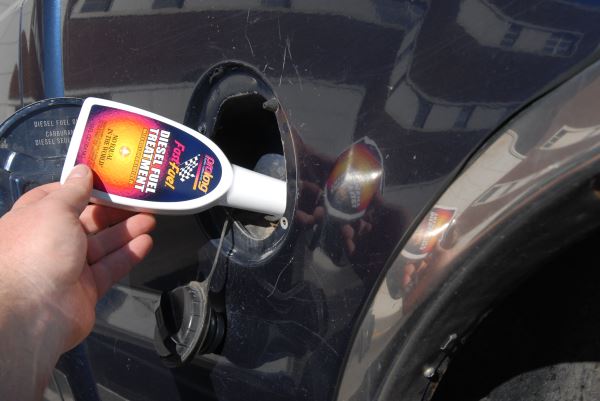 No matter the modifications, over the life of your truck, fuel will be your single largest operating expense. There’s no way around it and if history has taught us anything, fuel prices are only going to go up.
No matter the modifications, over the life of your truck, fuel will be your single largest operating expense. There’s no way around it and if history has taught us anything, fuel prices are only going to go up.
It’s The Law
This story really begins back in 2006. Ultra Low Sulphur Diesel (ULSD) fuel had been the industry standard for Europeans for years but in June of 2006, the EPA issued a mandate requiring 80 percent of the highway diesel fuel produced or imported to meet the 15 parts per million (ppm) standard. Basically, ULSD fuel has been refined so that its sulphur content is 15 ppm or less. Before this mandate, the average standard highway-use diesel fuel contained an average of 500 ppm of sulphur.
Sulphur, a natural part of the crude oil from which diesel fuel comes, is the reason soot is in diesel and therefore causes black exhaust fumes. Since 2010, ULSD is the legal standard across the country.
ULSD fuel is made to work with diesel engines that were produced for the 2007 model year and beyond. The goal is for ULSD to help the new generation of diesel vehicles to meet the same strict emission standards as gasoline-powered vehicles. What makes these new engines different is they have an emissions-reducing device called a particulate filter. The process is like a self-cleaning oven: a filter traps the tiny particles of soot in the exhaust fumes. The filter uses a sensor that measures back pressure, or the force required to push the exhaust gases out of the engine and through to the tailpipes.
The concern for daily drivers with older models is that ULSD has a lower lubricity and cetane rating, which could negatively influence pre-2007 diesel engines and fuel systems. Theoretically, proper lubrication formulas should be mixed in before the fuel hits the pump at your local gas station, but who really knows?
Reasons To Buy
Here is where fuel additives can come in. They help combat this problem and here are some reasons fuel additives make sense.
First, fuel additives contain additives that refiners don’t use. The first and cheapest additive that a consumer wants is a water remover. Water naturally enters fuel through different points at refining, transport, storage and operation. Suspended water in diesel fuel hurts combustion, lowers energy content, fouls injectors, wears out pumps, chafes injector tip needles and causes gum and varnish. In the winter months, water ices up and blocks fuel lines. Water can separate into oxygen and hydrogen, and combine with fuel to create sulfuric acid. You’ll never see a water remover as an additive in standard fuel because ppm of water changes constantly. The only way to get a water remover is a bottled additive.
Second, refiners may not use enough different types of additives. There are four defined properties of diesel fuel that have to be met before it can be labeled premium. The four properties are cetane number, low-temperature operability, thermal stability and fuel-injector cleanliness.
You don’t always get fuel with a good cetane number, low-temperature operability in certain months, thermal stability and fuel-injector cleanliness. A refiner or distributor can call it premium fuel if it meets all four standards, but the regulations are surprisingly loose. Low-temperature operability does not apply in most months, so buying premium fuel only assures a consumer of three standards.
Third, if refiners use additives, they don’t necessarily use enough. The refiners and distributors treat their regular grade fuels enough to make them consistent with the last batch they produced. But consistent doesn’t always mean great. Being consistently weak in the additive part of the fuel isn’t a good thing at all.
Do The Math
Premium diesel can be 10 to 20 cents per gallon higher than standard and there are no guarantees. Additives cost 2 to 4 cents per gallon. Since you put it in yourself, you can be assured that you are improving at least one of the important areas of diesel fuel: to remove water, to clean injectors, to lower pour point, to boost cetane numbers or to add lubricity.
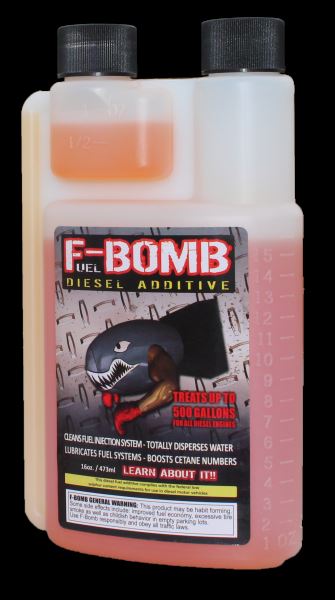 F-Bomb From Fuel Bomb
F-Bomb From Fuel Bomb
Labeled as habit-forming for your truck, this company encourages you to drop an F-Bomb on bad fuel economy. Fuel Bomb's F-Bomb Diesel Fuel Additive is a proprietary blend of chemicals that is designed to help diesel run better and cleaner. One can of F-Bomb fuel additive will clean injector systems, improve cetane number, control ice, prevent the algae and bacteria from growing, add lubricant, stabilize stored fuel and increase your miles per gallon.
The 16-ounce bottle treats up to 500 gallons. At $14.95 a bottle, that’s less than 3.5 cents per gallon. (www.fuelbomb.com)
.jpg_600.jpg) Prolong Super Duty Diesel Fuel Treatment From ProLong
Prolong Super Duty Diesel Fuel Treatment From ProLong
Need to meet emission standards in order to register your truck? Prolong Super Duty Diesel Fuel Treatment can help. It contains quality detergents to clean not only injectors, but the entire fuel system. It also provides protection against corrosion, decreases black smoke and helps reduce sludge build-up to enhance performance and fuel economy. The increased fuel lubricity helps protect against premature pump and injector wear. The 12-ounce bottle is available for $9.95 and works for 16 to 20 gallons of fuel. (www.prolong.com)
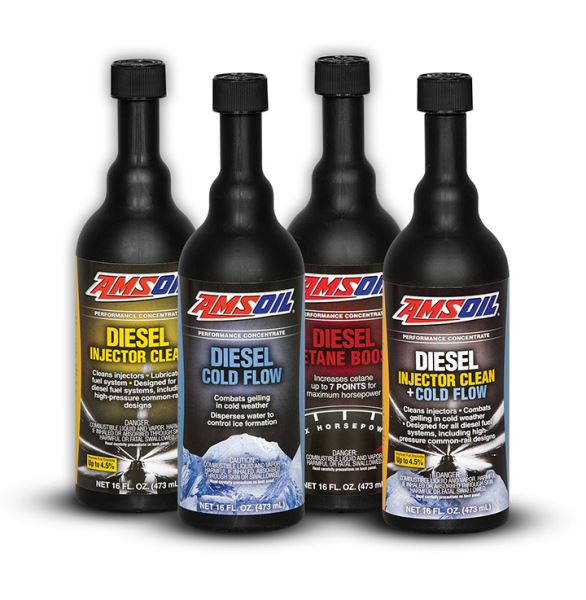 Diesel Injector Clean From AMSOIL
Diesel Injector Clean From AMSOIL
AMSOIL has an entire line of fuel additives that will do everything from clean injectors to boost the cetane number. They stay away from making an all-in-one product because they believe that it sacrifices performance in the name of convenience. Each of the products is priced under $10, so AMSOIL is an economical option. The Diesel Injector Clean removes performance-robbing deposits from diesel fuel injectors, which helps restore horsepower and improve fuel economy. It is formulated for all types of diesel engines, including high-pressure common-rail designs. Diesel Injector Clean is formulated specifically to clean both the tough-to-remove internal diesel injector and traditional carbonaceous deposits. The 16-ounce bottle retails for $7.90. (www.amsoil.com)
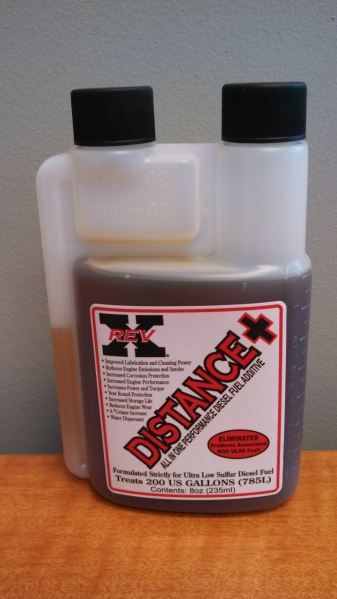 DISTANCE+ From Rev X
DISTANCE+ From Rev X
For today's Ultra low sulfur diesel fuel, you need the highest quality summer fuel additive. Rev X has you covered with DISTANCE+ Diesel fuel additive. The DISTANCE+ fuel additive was formulated to be a true all-in-one ULSD fuel additive. Some of the main benefits include increased detergent and lubrication properties, increased water dispersion, reduced EGT temperatures, reduced wear on components and it dramatically increases fuel storage life. Another great thing about DISTANCE+ fuel additive is that it’s cost effective, and the most complete high performance fuel additive available for diesel tucks in summer conditions. An 8-ounce bottle will treat 25 gallons of fuel and set you back $17.95. (www.revxoil.com)
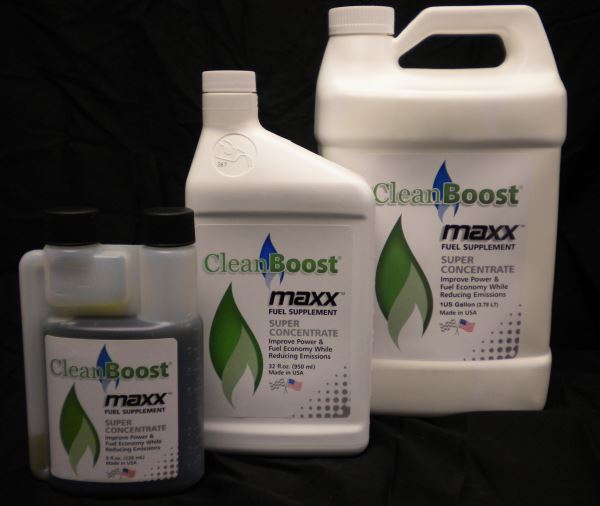 CleanBoost Maxx From Combustion Technologies
CleanBoost Maxx From Combustion Technologies
CleanBoost Maxx fuel additives offer a simple, cost-effective approach to combat today's high fuel cost, especially where incomplete combustion is a problem. It will reduce fuel consumption, typically by three to five percent, and decrease diesel particulate emissions by up to 43 percent. CleanBoost Diesel additives are also designed to help reduce water, with the company’s testing showing that as much as 36 percent of the entrained water can be removed. CleanBoost Maxx improves fuel efficiency and combustion efficiency, by liberating more of the fuel's chemical energy during the power stroke of diesel engines. An 8-ounce bottle is available for $16.95. (www.combustionusa.com)